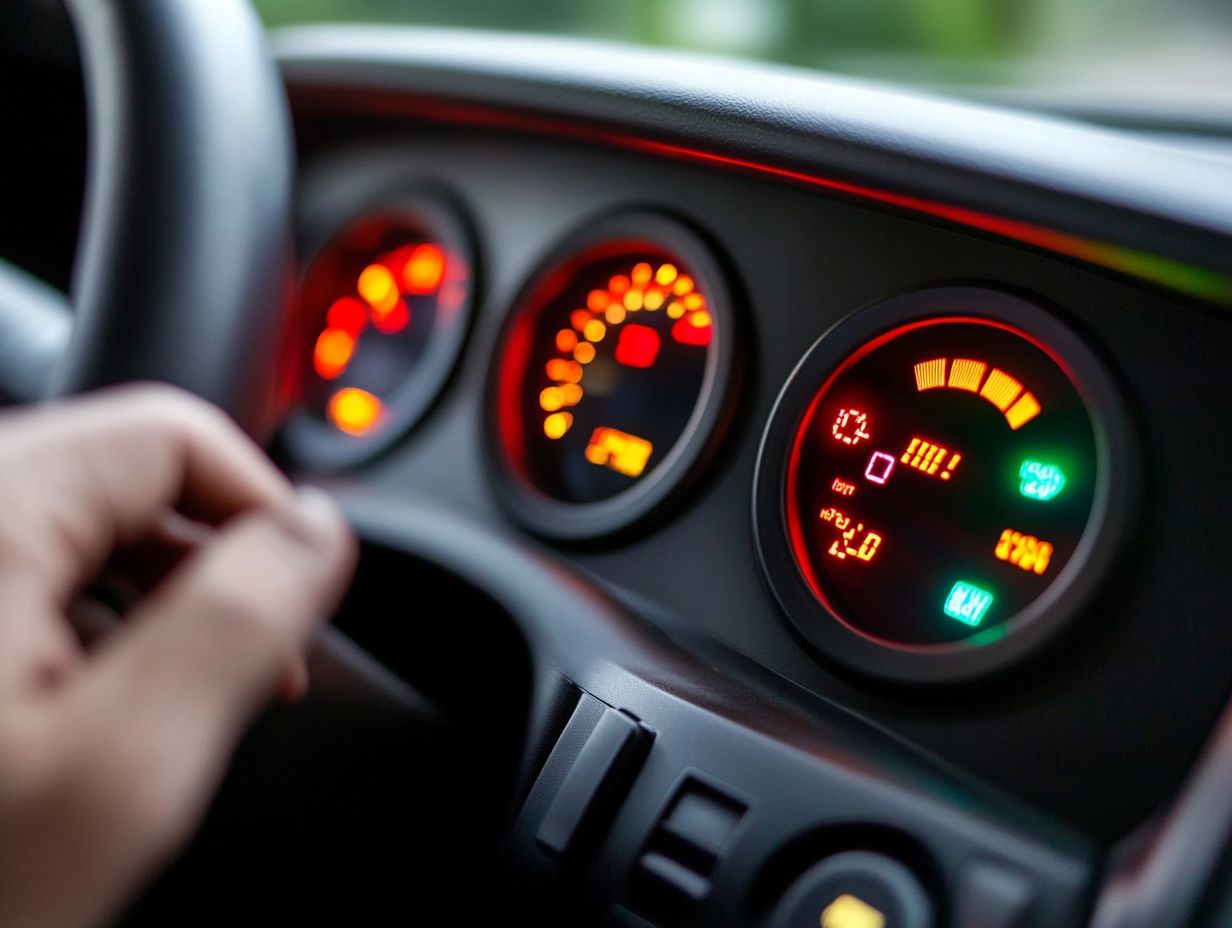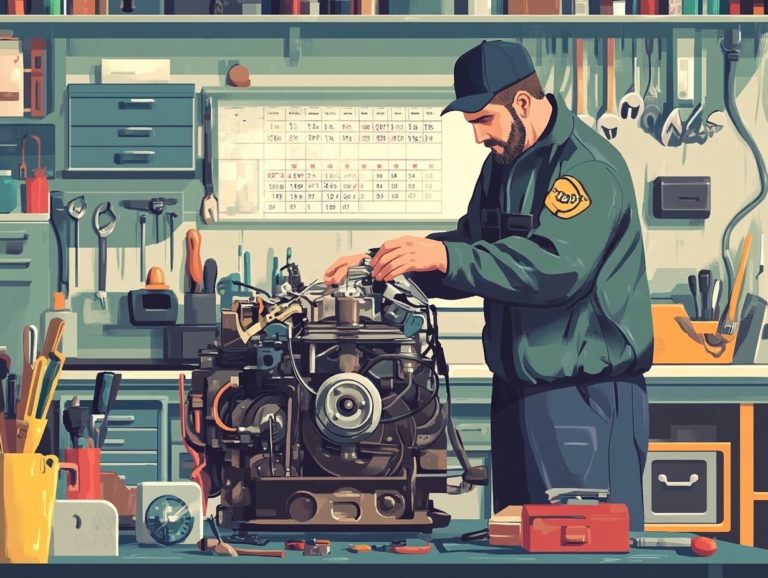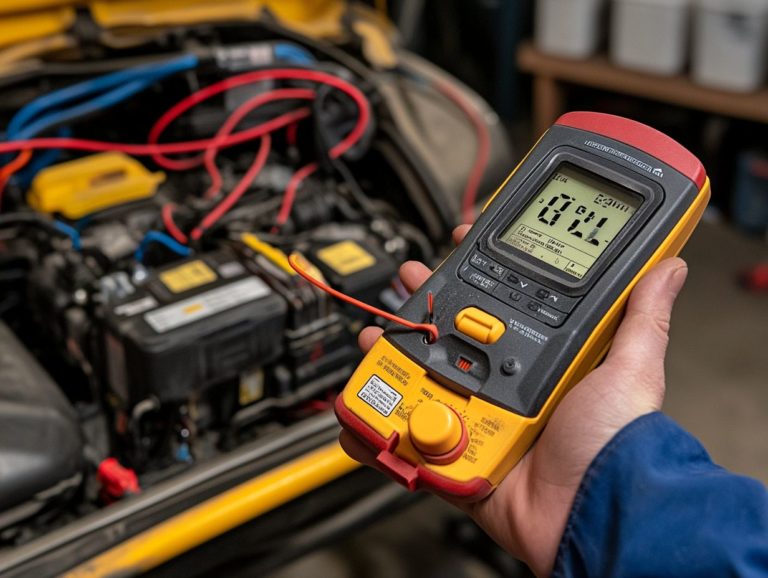5 Signs You Need to Visit a Mechanic
Paying attention to your vehicle can prevent expensive repairs and keep you safe on the road!
Your car often communicates subtle hints that something might be off, whether it s strange noises, dashboard warning lights, unusual smells, or changes in performance.
This article delves into five critical signs that indicate it s time for a visit to the mechanic. It also covers common car troubles, the importance of regular maintenance, and tips for finding a trustworthy mechanic.
Stay informed and keep your car running like a dream!
Contents
- Key Takeaways:
- 1. Strange Noises or Vibrations from the Vehicle
- 2. Dashboard Warning Lights Are On
- 3. Difficulty Starting or Stalling
- 4. Unusual Smells Coming from the Vehicle
- 5. Changes in Handling or Performance
- When Should You Take Your Car to a Mechanic?
- Frequently Asked Questions
- What are the 5 signs that you need to visit a mechanic?
- What types of strange noises indicate that you should see a mechanic?
- Why should I pay attention to warning lights on my dashboard?
- What does it mean if my car is having difficulty starting?
- Should I be concerned if I feel unusual vibrations while driving?
- Is it normal for my car to leak fluids?
Key Takeaways:

- Don’t ignore strange noises or vibrations from your vehicle; they could signal a larger issue.
- Dashboard warning lights should not be ignored; they indicate problems that need addressing.
- Difficulty starting or stalling may suggest a failing engine or other mechanical issues.
1. Strange Noises or Vibrations from the Vehicle
Experiencing strange noises or vibrations from your vehicle may signal underlying issues that need immediate attention from a trustworthy mechanic. These signs serve as early warnings of possible car issues that could escalate if not promptly addressed.
Common culprits behind unusual sounds include engine problems like a misfiring cylinder or low oil levels, which can lead to severe damage if left unchecked. You might also hear grinding noises or have difficulty shifting gears due to transmission problems, highlighting the need for professional assessment. Worn-out components, such as suspension parts or brake pads, can further detract from your driving experience.
Prioritizing a detailed repair quote and thorough car diagnostics is crucial. Identifying the root cause early can save you time and money, ensuring your vehicle remains safe and reliable for the journey ahead.
2. Dashboard Warning Lights Are On
When dashboard warning lights flicker to life, it’s your vehicle s way of sending an urgent message. These alerts point to potential issues in vital systems like the engine, air conditioning, or fuel injection that require immediate attention from a qualified mechanic.
Understanding the significance of each warning light is essential, as they reveal specific problems that could jeopardize both your safety and your vehicle’s performance. For example, a check engine light might indicate anything from a loose gas cap to severe engine troubles, while an oil pressure light could warn of declining oil levels that may result in engine failure.
Disregarding these warnings can lead to expensive repairs and heightened risks on the road. That’s why it’s crucial to secure a written estimate for any necessary repairs. This approach guarantees transparency regarding costs and protects you from hidden fees that often accompany auto repairs, fostering a more trusting relationship with your service providers.
3. Difficulty Starting or Stalling
Experiencing difficulty starting your vehicle or frequent stalling likely signals a range of automotive concerns, from battery failure to fuel system issues. This should prompt you to visit a local mechanic without delay to avoid further complications.
Many drivers tend to overlook seemingly minor symptoms, thinking they are just quirks of an aging engine. However, these issues often stem from a weak battery that struggles to hold a charge, clogged fuel injectors that disrupt proper fuel flow, or problems with the ignition system.
Ignoring these warning signs could lead to more severe issues and costly repairs down the line. It s wise to seek a second opinion on repair estimates to ensure you’re not overspending and that all potential problems are being addressed thoroughly.
4. Unusual Smells Coming from the Vehicle

Unusual smells wafting from your vehicle can signal serious car problems, such as burning oil or coolant leaks. These issues shouldn’t be taken lightly; they call for immediate inspection by a skilled mechanic to avoid costly repairs later.
If you catch a whiff of something sweet and syrupy, it may indicate a coolant leak, which could lead to engine overheating if left unchecked. The unmistakable scent of burnt rubber may indicate a problem with belts or hoses, demanding your prompt attention.
When you encounter these issues, gather quotes from various auto repair shops. This strategy ensures that essential repairs are conducted effectively while allowing you to compare pricing helping you steer clear of hidden fees that could arise during the repair process.
5. Changes in Handling or Performance
Noticing changes in your vehicle’s handling or overall performance should raise a red flag. These could indicate significant car problems like alignment issues or brake failures that need immediate attention from a skilled mechanic to ensure your safety on the road.
You might experience performance fluctuations through unusual noises or vibrations. Decreased fuel efficiency can also point to underlying mechanical issues or worn-out components. If you notice a decline in acceleration, it could indicate engine troubles or transmission wear.
Inconsistent braking? That s a serious safety concern you don’t want to ignore. Regular automotive maintenance checks are essential for identifying and addressing these issues early.
By taking proactive steps, you can enhance your car’s efficiency, longevity, and reliability. This ensures a smoother and safer driving experience for yourself and your passengers.
When Should You Take Your Car to a Mechanic?
Knowing when to take your car to a mechanic is crucial for maintaining safety and performance. Keep an eye out for clear signs, such as unusual noises, warning lights, or any changes in performance; these indicate urgent repairs that should not be postponed.
Stay alert for symptoms like leaking fluids or vibrations during acceleration. Difficulty starting the engine is another signal that your vehicle may require professional attention. You must act quickly on these signs to keep your car running smoothly!
When you’re searching for a reliable mechanic, prioritize customer service as a key factor. Researching online reviews and testimonials can provide valuable insight into their professionalism and expertise.
Opt for mechanics who communicate clearly and offer transparent pricing. This approach elevates your repair experience, ensuring that necessary fixes are carried out effectively and efficiently.
What Are the Common Causes of Car Troubles?
Understanding the common causes of car troubles can help you proactively address issues, whether they stem from routine maintenance oversights or mechanical failures. This awareness helps minimize the risk of unexpected repair costs and hidden fees.
Remember that environmental factors, such as extreme temperatures or harsh road conditions, can also impact your vehicle’s performance.
Your driving habits play a significant role, too. Aggressive driving, frequent short trips, and ignoring warning signs can accelerate wear and tear. By being mindful of these influences, you can cultivate a more reliable driving experience.
Consulting with automotive technicians for a thorough inspection is invaluable. These professionals can identify underlying concerns and recommend personalized maintenance strategies, ensuring your car operates at its best and keeps you safe on the road.
What Are the Benefits of Regular Maintenance?

Regular maintenance is crucial for ensuring the longevity and efficiency of your vehicle. It provides benefits such as improved fuel efficiency, reduced repair costs, and enhanced safety on the road through timely automotive service.
Integrating services like oil changes and tire rotations into your regular maintenance schedule helps you deal with problems early. For example, routine oil changes keep the engine lubricated and running smoothly. Tire rotations promote even wear, extending tire lifespan and improving traction.
These practices minimize the risk of unexpected breakdowns and contribute to a smoother driving experience. Prioritizing this maintenance is essential for anyone looking to sustain their vehicle’s performance over time. Don’t wait until it’s too late!
How Can You Find a Reliable Mechanic?
Finding a reliable mechanic is essential for ensuring your vehicle receives the best care possible. This requires a bit of research, including seeking customer referrals, looking out for red flags, and obtaining written repair estimates.
Start by diving into online reviews on platforms like Yelp or Google. They offer a glimpse into the experiences of previous customers. Don’t underestimate personal referrals from friends or family; their firsthand insights often lead you to trusted professionals.
Transparency in pricing is vital, so be sure to request detailed breakdowns of costs to avoid unwelcome surprises. Engaging in initial consultations allows you to evaluate service quality. Pay attention to how well the mechanic communicates about necessary repairs; this can build a trustworthy relationship over time.
What Are the Most Important Questions to Ask a Mechanic?
Asking the right questions when consulting a mechanic is essential for navigating your automotive concerns with confidence. This ensures you have a comprehensive understanding of repair costs, service processes, and the quality of work you can expect.
This proactive approach creates a transparent dialogue with your service provider. Make sure to ask these important questions:
- Warranty coverage for the repairs being performed,
- Detailed repair procedures that will be followed,
- Any potential hidden fees that may arise.
Understanding these elements can save you from surprises when it s time to settle the bill. This fosters a trusting relationship between you and your mechanic while ensuring that the necessary work meets professional standards.
What Are the Most Common Car Repairs and Their Costs?
Understanding the most common car repairs and their associated costs enables you, as a vehicle owner, to prepare for necessary maintenance and make informed decisions when seeking services from a mechanic.
For example, brake replacements generally cost between $300 and $800, depending on your vehicle and whether it s just the pads or the entire braking system that needs attention. Engine diagnostics usually range from $100 to $200, based on the complexity of the issue at hand.
Factors like the specific make and model of your car, regional pricing, and the expertise of the shop all play a role in determining these repair costs. Therefore, it s prudent to compare quotes from various repair shops. This helps ensure you receive the best value for your money and shields you from being overcharged for services.
Frequently Asked Questions

Here are some common questions vehicle owners have:
What are the 5 signs that you need to visit a mechanic?
The 5 signs your car needs a tune-up include strange noises, warning lights, difficulty starting your car, unusual vibrations, and leaking fluids.
What types of strange noises indicate that you should see a mechanic?
Listen for grinding, screeching, or clicking sounds. These could mean something is wrong with your car.
Why should I pay attention to warning lights on my dashboard?
Warning lights alert you to potential issues. Take them seriously and consider checking for the 5 warning signs of common engine problems before visiting a mechanic if one lights up.
What does it mean if my car is having difficulty starting?
If your car struggles to start, it might have a failing battery or starter. A mechanic should diagnose the problem quickly.
Should I be concerned if I feel unusual vibrations while driving?
Vibrations can signal problems with your tires or suspension. Have a mechanic inspect your vehicle to find the cause.
Is it normal for my car to leak fluids?
No, leaking fluids are a red flag. This could indicate issues with your engine or transmission, and you should see a mechanic right away.





